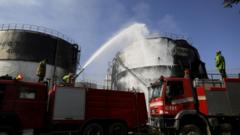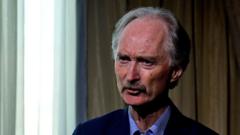The increasingly tenuous cease-fire between Israel and Hezbollah is largely dependent on the Lebanese Army, which is charged with ensuring compliance from the militant group during a 60-day truce. The cease-fire calls for a gradual withdrawal of Israeli forces and a corresponding pullback by Hezbollah from the Israel-Lebanon border. However, the Lebanese Army, composed of 10,000 troops and faced with significant internal challenges, has a history of inadequately restraining Hezbollah’s military actions.
**Fragile Cease-Fire Between Israel and Hezbollah Relying on Lebanese Army's Capabilities**

**Fragile Cease-Fire Between Israel and Hezbollah Relying on Lebanese Army's Capabilities**
The current peace agreement between Israel and Hezbollah hinges on the Lebanese Army's ability to enforce it; a task it has struggled with historically.
Under the terms of the new truce that began this week, the Lebanese Army must eliminate Hezbollah’s military installations, seize unlawful weapons, and obstruct the transfer and production of arms within a designated buffer zone along the border. Although the United Nations peacekeeping forces will support the Lebanese Army, the success of this mission remains uncertain.
Historically, the Lebanese Army was given a similar mandate in the aftermath of the 2006 Lebanon War under Resolution 1701, but failed to prevent the strengthening of Hezbollah, which has since developed a robust arsenal and extensive military infrastructures like tunnels.
Despite past failures, the international community, led by the United States, is once again seeking to bolster the Lebanese military through training and resources, hoping for a different outcome this time. The ongoing tension in the region underscores the complexity and fragility of peace efforts, illustrating the challenges of implementing effective checkpoints against entrenched militant groups.
Historically, the Lebanese Army was given a similar mandate in the aftermath of the 2006 Lebanon War under Resolution 1701, but failed to prevent the strengthening of Hezbollah, which has since developed a robust arsenal and extensive military infrastructures like tunnels.
Despite past failures, the international community, led by the United States, is once again seeking to bolster the Lebanese military through training and resources, hoping for a different outcome this time. The ongoing tension in the region underscores the complexity and fragility of peace efforts, illustrating the challenges of implementing effective checkpoints against entrenched militant groups.


















